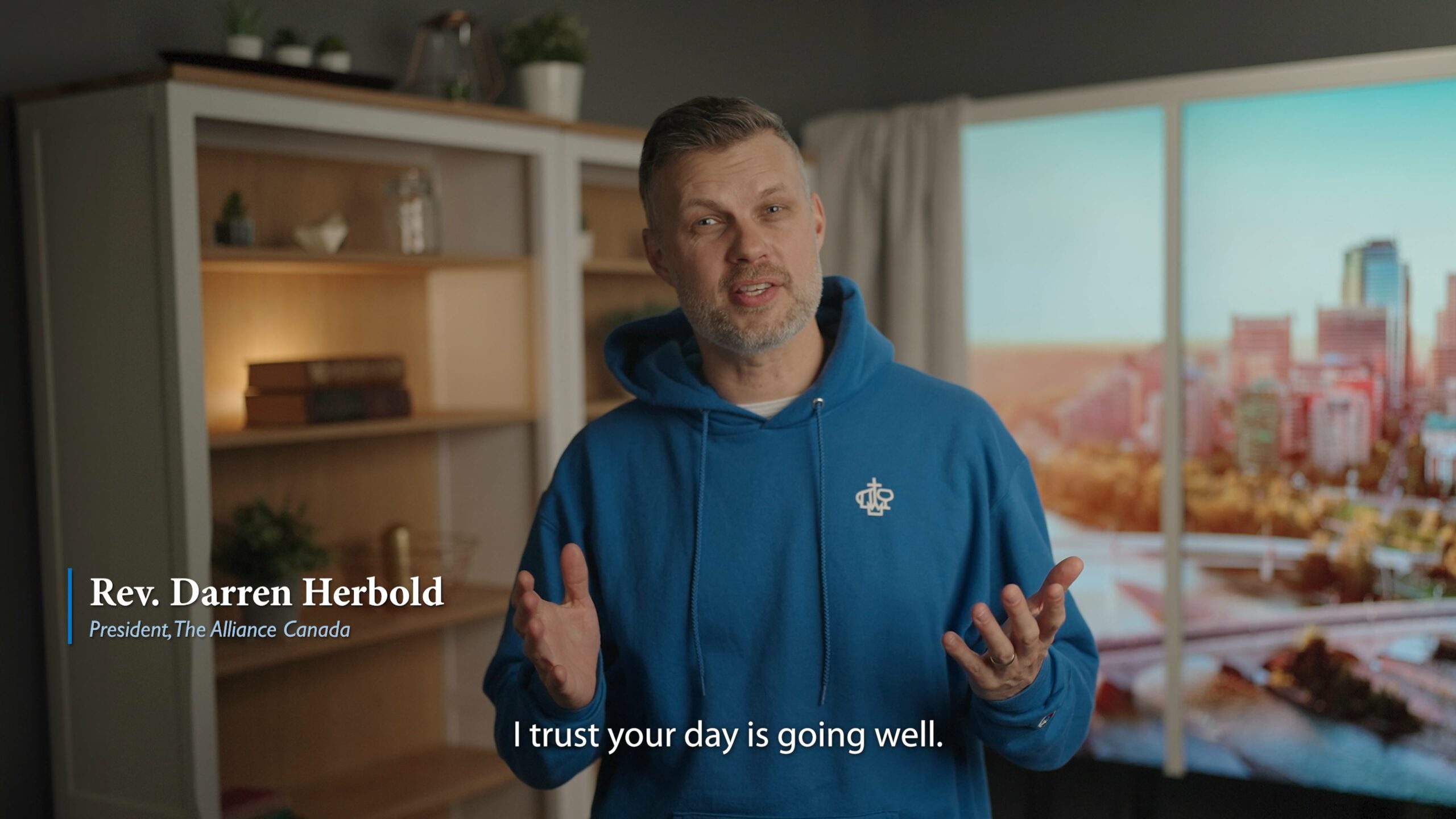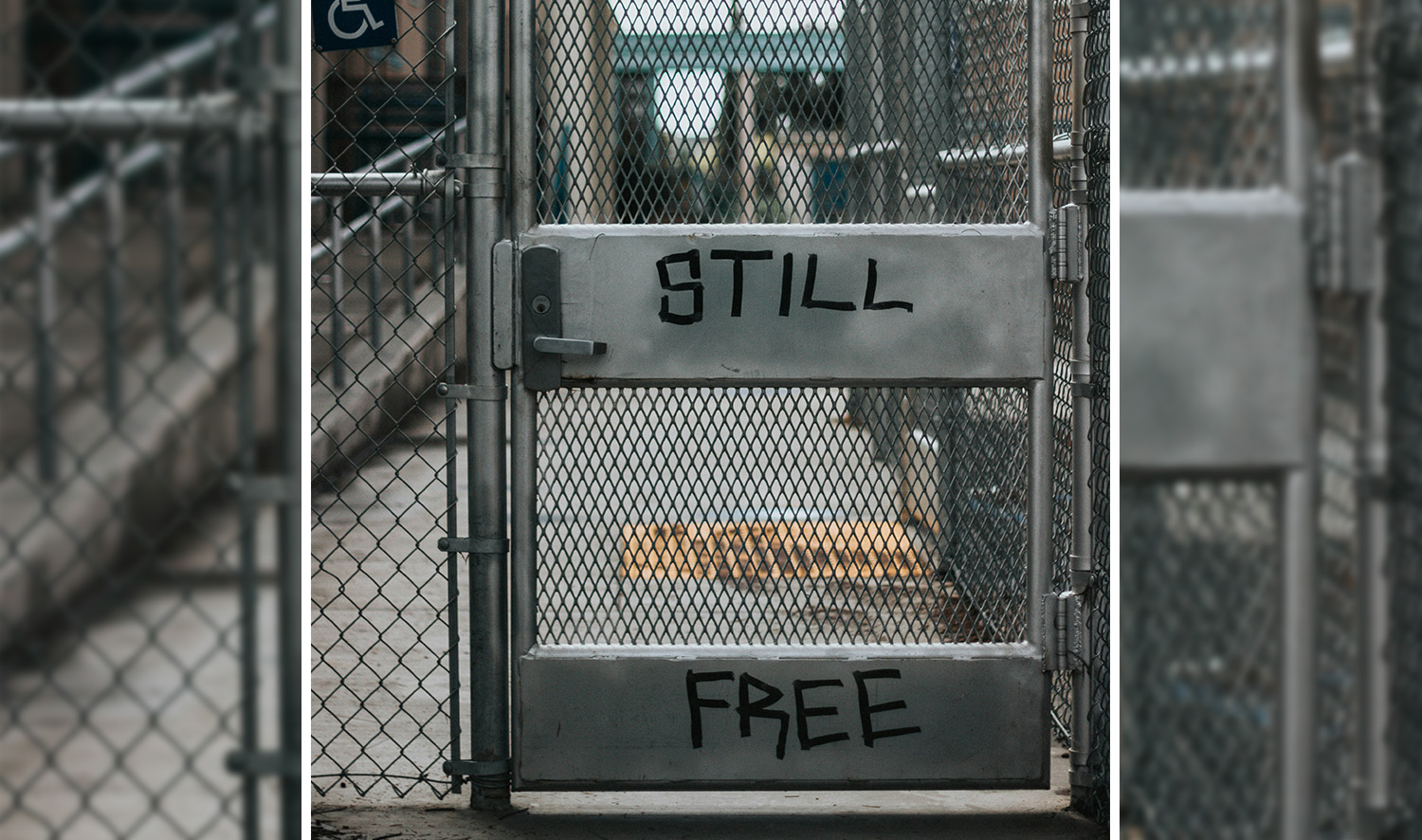This article is written from the viewpoint of Christian and Missionary Alliances Chaplains working within a health care setting and not of the employer organization. To protect privacy and confidentiality – names and details of the interventions described in this letter have been changed.
I breathe in.
My lungs swell with cold morning air. This sends a quick message to my brain that the new day is about to begin. I walk up the hill toward the hospital. My heart remembers the resistance the patient from the previous day demonstrated, not just to me, but to everyone. What was behind the anger? There is always a primary emotion behind this secondary response.
My walk is interrupted by a greeting of, “Hello, Jonathan,” A smile, forced, follows. I look up at her with concern, watching her tears slide down her cheeks and drip to the ground as she relays how hard it is that no family members are able to be with her patients, and as she conveys the weight of their loneliness; and her isolation. We maintain our distance. I receive her distress and offer a reassuring glance, acknowledging her emotions and validating her pain.
I enter the screening area and ask a member of the screening team how they are doing. An emotive response follows as the nurse relays several narratives in quick succession of distress, feelings of helplessness, and hurt as others, even other staff, have taken their frustration out on them. They are sometimes lied to by family members trying to get in to see a patient. I acknowledge the portrayal of their distress. I validate their emotions, acknowledge that they are in a very difficult position, and mirror self-compassion that they are doing the best they can. We explore what they need and address how to communicate with distressed people through validating their pain and frustration, then explore Non-Violent Communication techniques (observations, feelings, needs, requests) without negations to de-escalate tense situations. This person is in tears as she acknowledges how meaningful it is that someone is there to listen to her and feels comforted that someone took time to check in and acknowledge her.
I now enter my office. The lights are off but the phone message light is on. There are several messages, ‘my father is going for a surgery, my daughter can’t see her daughter: is lonely and quite upset, can we have a priest offer sacrament of the sick?’ There is a message on the pager; now two on the pager. ‘The patient from yesterday wants to see Spiritual Care. A colleague is sick and unable to come to work, another is on isolation.’
I go to the printer and prioritize the list of referrals that have come in: ‘patient at end of life, please provide support. Patient lonely and isolated. Patient being told of disease progression today and poor prognosis – please support family who have not been coping well. Patient contemplating Medical Assistance in Dying and requires support for decision making.’ One of my mentors taught me to embrace chaos.
I go onto the unit and sit down with the young lady who is dying and refused care previously. I feel uncertain about my plan or the value I will be to this person. However, I am open and curious. I enter Tina’s sacred space. She is indigenous and is awaiting a naming ceremony which an elder will facilitate. She has withered and changed since I last saw her. The change is dramatic; time is fleeting for this wounded woman.
“Hello Tina. It’s Jonathan, from Spiritual Care. Your nurse said you asked to see me.” I did not get another word out. “I am glad you are here,” she said weakly. “You’re going to listen,” she said more strongly. She spoke about the mistakes she felt were made in her care, the time and life it cost her, and the distress it has caused her and her family. She portrayed the magnitude her distress and then, with almost alacrity, said, “I need to rest now. I am done.” Amazed, I contemplate what I just witnessed. It seems she entrusted me with her burden and was
now free from it.
I leave the room and find myself standing face to face with a nurse who describes a distressing family systems issue. The patient is about the same age as the nurse and this is touching close to home. We explore this and she said, “This is so hard. I can’t even give him a hug.” I validate the helplessness she feels and explore what she needs in the present moment.
As I enter this patient’s room, the mother is at the bedside, along with two others, when I ask how I may support them. She looks toward her husband, who is in the corner of the room standing, which raises a flag for me. What is keeping him from being nearer his dying son? I look at him and his son lying in the bed and simply ask, “George, what are you going through right now?” This is an open-ended question. It allows the father to choose what is important to him.
“I don’t know what’s wrong with me. I keep crying and thinking about my dad,” he replies. My spiritual assessment skills tell me there are two issues here. Object Relations Theory explores how humans are motivated by need for contact with others – they need to form relationships (as contrasted with sexual drives from Freudian theory). People have positive or negative experiences that affect relationships. This creates impulses to act or behave towards another person in particular ways. When there is a breakdown or loss in relationships, people seek ways to relate to the other. In this case, because George made a self-critical statement, I suspect that he sees himself as not good enough compared to his father (good object) and is longing to connect with his father and is missing this connection or relationship.
According to myhealth.alberta.ca, unresolved grief can show up as uncertain feelings about the person who has been lost, negative opinions about their own selves (low self-esteem), or as preoccupation with the memory of the lost person and isolation from others (along with many other factors). If this person is thinking about his deceased father instead of his dying son, there is grieving to do. Both are solitary work which may not be conducive to an audience, so I ask him if he would be willing to share about this in the family room. The father and mother of the patient both nod yes to this.
We leave the patient’s room and George settles on the couch. “Tell me about your dad,” I ask. “He was a farmer and such a good man. He was full of integrity. He always provided for us. We didn’t have much, but we never lacked.”
“He sounds like a faithful person.”
“Oh, yes, the most faithful. And so well respected.” (Begins to cry) “But every time I think of him, I can’t control myself. I just start crying like I am now. I feel so weak. Not like him, he never sobbed like this. What would he think of me?”
Do you see the positive and negative relationship? In Object relations terminology this sometimes referred as the good object and bad object. Did you also notice the uncertain feelings about the father and the low opinion if himself? He seems to have a low view of self.
“It’s been twenty years since he passed and I miss him so much, I just can’t stop thinking of him even though my son is in the other room.”
George accentuated ‘miss him so much.’ Deep within my own spirit I recall a similar emotion – the longing for relationships lost. My grandparents come to mind. I retain the emotions to connect empathetically with George but the memories I put to the side for another time.
I lower my head and voice and use some of his words, “I hear you really miss him.”
This seems to give him permission to grieve as his tears turn to sobbing. Now that he has had time to grieve what he has lost, I am going to try and offer him a new connection, a new way of relating with his father. I am going to utilize a technique my mentor modelled for me called Other Envisioning. This technique asks the griever to use their imagination to engage the person who is deceased, or not present, as being there, and to say whatever they desire to that person. It is re-establishing a connection or new way of relating with potential to continue relating in this
way. It envisions new possibilities and a new future.
“George, if you could envision your dad sitting here, on the couch beside you, what would you say to him?”
He pauses, draws a breath in and lowers his head. After a moment he says, “That’s not the question I would ask.”
This surprises me. In all my experiences with this technique the person has always responded with words of their own. Am I missing something? I am curious what he would ask.
“The question I would ask is, ‘What would he say to me?’”
Whoa, this is brilliant. I hadn’t thought of this perspective. This needs to be in his own words so that he will own this part of his experience. The words of my mentor, “Let the patient do the work,” come back to my mind.
“Well, what would your dad say to you?” I ask with intrigue (excited by this unexpected possibility).
“Son,” he trembles for a moment when he says this but then, as if tapping into a new strength, continues on, “I love you. I am proud of you, just the way you are.”
He cried for another minute as I sat with him. Then he sighed and said, “I really needed to hear that.” He sat up, looked at me and smiled. “Thank you. That’s just what I needed. It’s time for me to go and be with my son now.”
I smiled back at him and watched him walk down the hall. Later, I walked by his son’s room: I saw him sitting at his side. Often we think of healing as being purely physical and sometimes instant. In my experience in acute care, I often see people healed emotionally, relationally and spiritually. The change is remarkable and unmistakable, but unless we are really paying attention it sometimes goes unrecognized. This work is both emotionally challenging and enlivening.
I sit down in the lunchroom with my colleague Bill Thornton, a CMA Chaplain. We explore the impact on him of caring for others during a pandemic.
“I feel a dissonance. It is an ambiguous feeling that things in our current COVID-dominated world are not the way they should be. I feel a shift from normal. There’s a resistance there – I don’t want this to be normal.” Bill refers to the visitor restrictions, “There is a sense in me that this is not right. I find my role changing. I am playing the role of advocate. There are patients needing to see family or a religious volunteer, like a priest, and those things can’t happen. I sometimes feel like a surrogate family member or surrogate priest.”
He continues, “It creates in me a deepening sense of calling. There is tremendous spiritual distress, and much is needed.” I am reminded of the Apostle Paul’s words, ‘I desire to do the thing I cannot do.’ Sometimes it creates a desire to do more than I can accomplish. I cannot reconcile with all of this loneliness. He says, “There is a helplessness I feel about not being able to do something about the loneliness” he witnesses every day.
Bill is a recent addition to the Spiritual Care team. He was a Chemical Engineer by trade until age 60. He then went to Ambrose and completed his M.Div. and Clinical Pastoral Education training and now enters the third trimester of life as a Spiritual Health Practitioner (Hospital Chaplain).
One of Bill’s strengths was to retool and embrace his emotional self in order to meet others with compassion and empathy in a nonjudgmental way. “I still feel like I am adjusting to the role and am still exploring how I remain open and empathetic and not carry this home.” Bill feels a heightened sense of concern to not carry something home. “When I am home, we do fewer normal things: see friends less, see my family less, and are less a part of the church. There are fewer things that revitalize me. So when I walk out of the hospital, I am not carrying certain patients with me. When I return to my desk at the end of the day, I open the credenza on my desk and light a tea candle to honor the grief.” We experience real grief in this role. I cared for a patient on one of my units and the children were not allowed onto the unit and this grieves me and I wonder ‘is there a better way to do this job?’
“There is a new cycle constantly in front of us. There is a sense of unknown in the second wave. I am learning to take in less news. I notice that with Covid there is no dividing line between work and home. Unease is always there. I feel anticipatory grief – there is another incident awaiting to arise; an anticipation of something negative. I wonder how we can manage our response to Covid better. This stimulates my sense of responsibility arising from years in management. In this role, it is not my place. I have to let some things go.”
Bill returns to the sense of calling he feels. “Being in God’s will, there is a purpose in what I do and I am equipped to do this. Every day is an unknown. It is not predictable.” As Bill has grown in his identity as a Spiritual Care provider, he has become more confident with dealing with the unpredictable. This comes with experience. “I trust in the tools I am equipped with. This helps me approach others in a non-judgmental way. I hold my own moral perspective loosely. I hold on to my faith when I intervene with and care for others, but I utilize curiosity to see what matters to the other person. This helps me be inclusive. I am not there to judge or evangelize. I have a heart to hear what they believe. I ask myself what is the most loving thing I can do. It opens curiosity and allows me to embrace the other. God is seeking each one, and in this role, we get to be a part of that.”
The father of the young patient from the morning calls and requests a pastor to talk to her about Jesus. It is not my role to proselytize in this setting, but the father can do this when he arrives. The next person is contemplating Medical Assistance in Dying. I always wonder how much a person is suffering to consider this. Is the person weary? Is it a loss of control? How does this affect their family? How does my theology of suffering affect my view of dying by this means? I walk down the hall of the unit until I find the person’s nurse (whom the patient has developed the most intimacy and trust with). The nurse is quite grateful I have arrived. “She is really struggling this morning making a decision. I felt she could use someone to explore this with her… and I know you will work your magic.” I smile at this (and briefly feel a touch of pressure and insecurity. What if I am not good enough?). The nurse has developed a trusting relationship with patient, and I have developed a trusting relationship with nurse. My mentor taught me that trust is transferable. I will be able to go into this room and be direct with the patient because of
this.
I knock on the door and introduce myself, “Hello Betty, I am Jonathan from Spiritual Care.” My eyes are focused on her – though I notice her spouse leaning over the sink with his head bowed. My voice is gentle, with concern in my tone, “The nurse let me know you were struggling with some important decisions this morning.” I use the nurse’s words -trusting her observations – to establish rapport. Immediately Betty’s countenance changes and tears emerge in her eyes. I acknowledge this.
“I see emotion in your eyes. May I sit with your and hear about where this is coming from in you?” Her spouse is still leaning forward against the ledge, his arms are folded, head bowed, and a perplexed look seems to be seeping from his countenance.
She wipes away her tears and says, “Please sit. You see, I have been in terrible pain for so long and I cannot bear it any longer. This cancer is eating me alive. I can’t think. I can’t function and I just want it to end. I want to die!”
“Oh my goodness. I can’t imagine how much you have been suffering.”
“I can’t begin to describe how much I have… and I just can’t manage it anymore.”
“Are you feeling weary?”
“Oh, yes. I am so weary. I love my family and I have a faith. I am a Christian, but I just can’t take this anymore. Is that wrong?”
I normalize her experience through utilizing her own faith background. “Jesus asked for his suffering to be removed.”
“Oh!” she sighs, “That’s right, he did.” There is a momentary reprieve, but this isn’t the big issue. Her face then becomes serious. She sobs, “I am afraid.”
I lean in toward her pain and lower my voice to accept what she is going to offer. “Tell me what you are afraid of.” Along with my re-posturing, this is my invitation to share the deeper distress she is feeling.
“Well you see, I believe in a loving, accepting God, though I don’t go to church, and I’m, (here she stutters to a stop and weeps), I’m afraid, if I die this way, I will go to hell.”
I purse my lips and furrow my brow. “That is a considerable and understandable fear.” Here there is an intentional silence on my part. I want her to know that I hear and feel the magnitude of her distress. It is also important that she sit and feel her own grief and pain. If she is moved too quickly out of it, it will linger, fester and become unresolved grief.
I am now going to be very direct through a question. If I make a lot of statements, then I am doing the work and she will not take ownership in her own story. My mentor once told me after I talked too much during an intervention, “Let the patient do the work.” A question allows her to do the work of assessing her own place in this narrative, it gives her the power to choose her own action, and it empowers her to explore new possibilities – things she has instead of what she does not have. It can move her from grief to a new, envisioned future.
I have validated her feelings, ‘I can’t imagine’, named emotions ‘weary’, and normalized her experience, ‘Jesus asked to be spared of suffering.’ Now, utilizing narrative therapy techniques, I will externalize the issue. Going to hell is a personal problem to her but it may be reframed as a theological problem which would allow her to not place judgment upon herself and see a different perspective. I will do this through asking a question with the theme she has presented. Courage is required to ask daring questions – they can always backfire. I am curious about her
faith and whether it can help resolve her distress. Curiosity does not kill the cat in this
profession, it is the means by which we enter, and honour, the space of the other.
“How does your fear of going to hell fit with your theology of a loving God?”
One of the gifts of this vocation is that it is always filled with surprises. The surprise was in the response… from the spouse… who unfolded and threw up his arms and said, “Well, it doesn’t.”
Betty exhaled, laughed, and it seemed like the weight of distress crumbled off of her. “No. It doesn’t at all. Well, that is so easy. Oh, it all makes sense now. I know what I want to do.” She smiled warmly at me. “Thank you. That is just what I needed.”
The denouement to this climax was so transformative, so sudden, that I almost felt dismissed. I was raised on the Proverb, “Let another’s lips praise you and not your own,” so it is hard for me to accept when I have done a ‘good’ job, but I did walk out of that room in awe of the transformation of faith that took place in front of my eyes.
There are many difficult things we are asked to do in this role. There are times when our beliefs, theology and values are challenged. The apostle Paul wrote in I Corinthians 9:22, “I have become all things to all people.” This enables me to be inclusive of the other – to embrace them where they are at. Their values become equal to our own and Bill and I must meet them there. The other person will never take full ownership of change or transformation if it is our values we are imparting. They will genuinely only do so when they do the work on their own narrative and when their need is met. Like Jesus saying, “If anyone gives even a cup of cold water” (Matthew 10:42), we are there to meet.
I begin to close my office door on this incredible day of compassion, healing, and transformation. I am bewildered by the mystery of events that unfolded before me. It is a quarter hour past quitting time. My kids and spouse are awaiting me.
The pager goes off.
My mentor taught me, “The poor (and sick) you will always have with you.” I hear this still, calm, voice, “Love yourself as your neighbour.” I get the point. I close the door of my office.
I walk outside to sunshine. I put on my cap – this is a ritual of changing my roles and leaving behind all of the days’ burdens.
Like my mentor; it is time to walk in solitary places.
I breathe out.
Share:
Find more posts about:
chaplain.john
Support the mission
The Global Advance Fund (GAF) is a pooled fund that supports our workers in Canada and around the world to share the Gospel with people who haven't yet heard the name of Jesus. Your continued generosity equips and sustains our workers and their ministry.









Thank you for giving us a glimpse of the experience of a hospital Chaplain.
Thank you for giving us a glimpse of the experience of a hospital Chaplain.
The Bible does not say “Love yourself as your neighbour”. It says “love your neighbour as yourself”. How do we do that. The ultimate love is telling them that we need salvation FROM SIN, only something Jesus Christ can do! Above all, “Love the Lord your God with all your heart, with all your soul, with all your mind and with all your strength.”
I ask myself during this crazy time, what have I done or said to show that my just Jesus is coming soon, that He alone provides eternal life after death, that sin & Satan brought death, but there is life in Jesus Christ, the only perfect sacrifice. Procelatize away, the time is short, and eternity is long! It’s all about Jesus! Submitted respectfully.
The Bible does not say “Love yourself as your neighbour”. It says “love your neighbour as yourself”. How do we do that. The ultimate love is telling them that we need salvation FROM SIN, only something Jesus Christ can do! Above all, “Love the Lord your God with all your heart, with all your soul, with all your mind and with all your strength.”
I ask myself during this crazy time, what have I done or said to show that my just Jesus is coming soon, that He alone provides eternal life after death, that sin & Satan brought death, but there is life in Jesus Christ, the only perfect sacrifice. Procelatize away, the time is short, and eternity is long! It’s all about Jesus! Submitted respectfully.